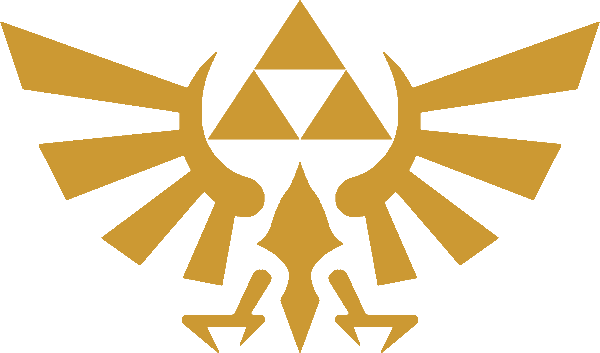
The Legend of Zelda is a long running series. 26 years to be exact, and it's definitely changed a lot since the very first release back on the NES. If we were to look at how the different games have been regarded by critics, there wouldn't be any noticeable trend, because Nintendo has always done their best to take what worked well, and implement it with some new stuff to make it fell like a newer experience, while still holding true to the core mechanics. After the break, we'll explore how each game has held up against critics, and more importantly, the test of time.
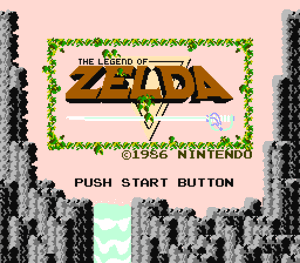
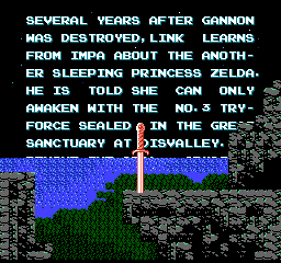
To start with, Zelda 1 was widely regarded as a fantastic game back in 1986, because it was ahead of its time due to the vast world to explore, and the save feature. Since critics could only compare it to other Nintendo games, or other old Atari games that were made previously, it was highly praised, and quickly became one of the games you had to get if you owned a Nintendo Entertainment System. Then, Zelda II came shortly thereafter. If the game were a standalone title, then it would have been fantastic, however, since everyone was comparing the game to its predecessor, it didn't fare as well. Personally, I feel that the games didn't do so well with the test of time, because even though they are still fun to play, and available on the e-Shop for the 3DS, the lack of direction makes them a little frustrating, and almost discouraging to anyone new to the series, but it also adds a little bit more challenge to the game, making them more enjoyable to some.
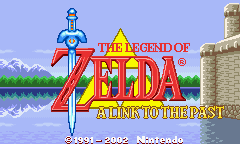
Then, we need to look at Link to the Past. Most people feel that it was the Zelda game that defined the entire franchise...just in 2D. It had the basic story elements that many other Zelda games followed, like the whole idea of going to get some stuff, then there's a plot twist, and you have to get more stuff, and so one and so forth. Most people call Ocarina of Time a 3D version of Link to the Past just because of how similar they are. Anyhow, it did really well against critics, however didn't do perfectly. Up until around 2005, it aged really well, as it was brought to the GameBoy Advance in a seamless port, which breathed new life into the old classic. It's on the Wii Shop Channel, but void from the e-Shop, as Nintendo is considering what to do with the title. Rumors speculate that they're going to remake it in 3D, or create a direct sequel to it, but currently we don't really know.
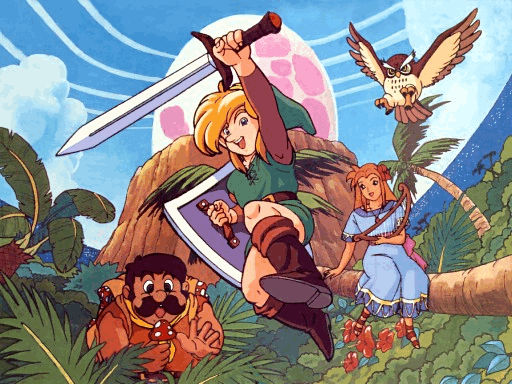
With Link's Awakening, I think it's clearly obvious that it didn't hold up well over the test of time, but I'll get to that in just a second. It was received rather well, and is usually called the best original portable Zelda game. Some people were rather wary with the fact that The Legend of Zelda had gone portable, as quite a few people were unsatisfied with how Nintendo brought Mario to the GameBoy, but Nintendo learned from their mistakes, and created a fantastic game. They later re-made it, but this time in Color, and with an extra dungeon, and some other little surprises, like a guy to take your pictures (which you could print out with the GameBoy printer, and no, it doesn't print money.) Therefore, it's only clear that it didn't really hold up well over that test of time, however it was one of the first titles brought to the e-Shop on the 3DS being released just the day after the big e-Shop update. It's still quite fun to play, and has some challenge to it, so if you haven't already purchased it, go buy it now.
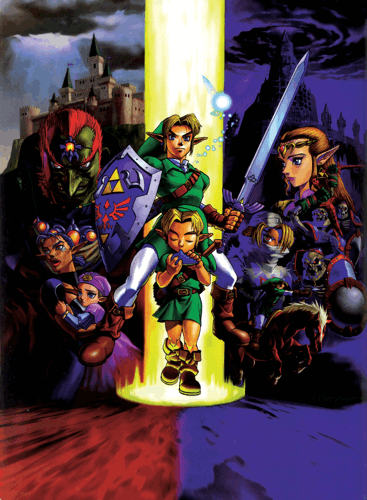
Now, we'll jump forward in time, with Ocarina of Time. This was the first 3D Zelda game, and it was also the first Stereoscopic 3D Zelda game. That seems quite fitting somehow. When it was released, it was quickly rated at the best video game of all time. It's still argued to be the best video game of all time, however it is no longer the highest-rated video-game of all time, as Super Mario Galaxy just claimed that title a few weeks ago. Clearly, the game was well received by critics, and the game itself did hold up quite well over the test of time, as it saw multiple re-releases in various formats on the GameCube whether the original, or the Master Quest version, while also being put in the Wii Shop Channel. Of course, the game was enhanced visually for the 3DS re-release, but I wouldn't really count that as holding up against the test of time, as Nintendo had to make some touch-ups to it, but the story still grips people, and the polygonal graphics still entice some.
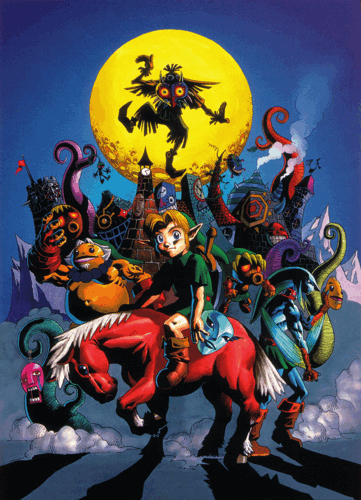
Soon after Ocarina of Time, another new 3D Zelda game for the Nintendo 64 released. This one being Majora's Mask. It was rated almost as well as Ocarina of Time, and was considered to be another elite Zelda title, however it didn't see the popularity that Ocarina of Time received. People received the game really well, and even consider it to be better than Ocarina of Time. I would say it's held up about as well as Ocarina of Time has, because visually they're identical, and musically, they're identical, however Majora's Mask had some little extra something that seems to have let it hold up a little bit better over the years. Maybe it's just the whole darker tone to it, or the fact that it's slightly different than any other Zelda game. Regardless, Nintendo is also trying to figure out what to do with this one, because a lot of people (including myself) would like to see it remastered and put onto the 3DS. Nintendo has acknowledged that people do want this, however they've said that they (Nintendo) want to bring an original Zelda game to the 3DS before doing a remake of Majora's Mask.
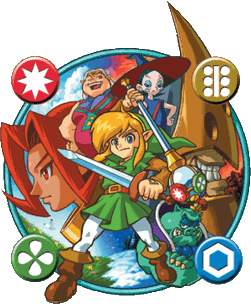
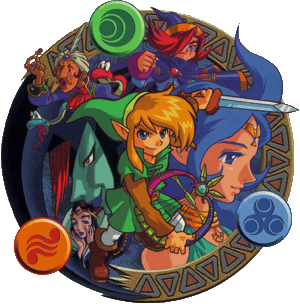
After Majora's Mask, the soonest release was the two Oracle games. Oracle of Seasons, and Oracle of Ages. These two games were actually developed by Capcom for the most part, and they were definitely well received. While critics and players like them, especially with the password communication between the two games, it seems Nintendo has almost forgotten about the two of them. They're not on the 3DS e-Shop, not on the DSi e-Shop, and not on the Wii Shop Channel. Hopefully we will see them appear on the e-Shop, or as part of some bonus for pre-ordering the next Zelda game on the 3DS, but who knows. Other than that fact, they've held up fairly well against the test of time. Of course, if you were to try to compare them to current portable titles, then no, they haven't really held up well, but they're still fun to play to this day, and definitely a timeless classic in terms of Zelda. With any luck, we will see something soon regarding these two titles, but probably not until E3 of next year.
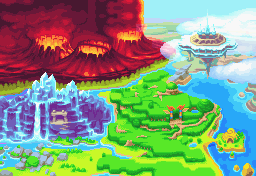
Then we got another portable Zelda title. Four Swords, with Link to the Past added onto it. Four Swords itself wasn't really that long a game, and was mainly the bonus with the re-release of Link to the Past, even though it was branded as Link to the Past being the bonus. Four Swords itself was another Zelda game developed primarily by Capcom, and the game cartridge was well received, but I'm pretty sure this is just because Link to the Past was on there too. If the game had just been Four Swords, it wouldn't have been received well at all, because critics would have all picked on it for needing at least two people to play it, with four being the maximum. Four Swords was of course put on the 3DS e-Shop in a 25th anniversary format last year, where you could play the entire game with just one person, or two, or even three. Nintendo removed the game from the e-Shop earlier this year, as it was no longer the 25th anniversary of The Legend of Zelda, and the game was part of the celebration for it.
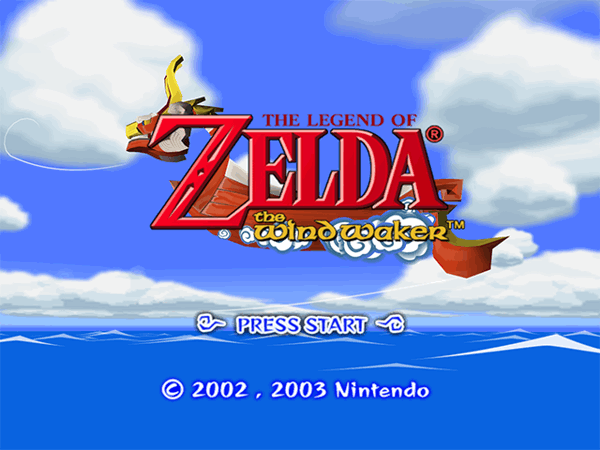
After Four Swords, we got another one of those gems that is held as possibly the greatest Zelda game of all time. This one was Wind Waker, and it was released rather quickly after Four Swords, but that's because this one was done by Nintendo themselves. Critics found it to be amazing, even though the art style might have been a little bit childish, Personally, I found the art style to be an amazing blend of realism with animated graphics. Some people were a little embarrassed to purchase it, and others were rather disappointed, as Nintendo had been showing a demo of a realistic looking Zelda demo for two years before announcing this one. And of course they announced about half a year before it was released, so it came as a major shock to some people. Honestly, I feel that the music in this game is quite possible some of the best music of the entire franchise, however each game has its own gems in terms of music. It has held up rather well over the years, and we can only hope that Nintendo has future plans for it, like an HD remake on the Wii U, or a 3D remake on the 3DS, however, it still looks fantastic on the GameCube. It of course still runs off of the Wii, so I don't really think Nintendo will do anything with this game until their next console, or sometime during the life of the Wii U.
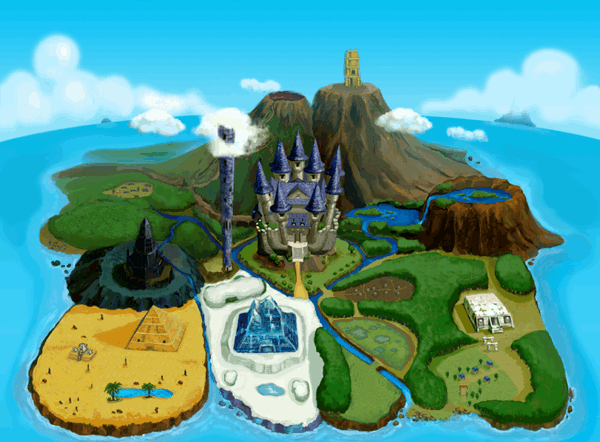
Next, we got another game on the GameCube, Four Swords Adventures. This game wasn't as well received by critics as some other Zelda titles were, however it's not a title to just disregard. While it was another different take on the Zelda franchise, it was developed by Nintendo themselves, and could be played with up to four people. You can still play it with just one person, however it probably is more fun with more people, but I can't speak from personal experience. The design of the game was a more linear level based one, where it was somewhat clear where you needed to go, and what you needed to do. It was still filled with tons of puzzles, possibly more-so than other Zelda games, which is why I see this as one of my favorites. After the initial release on the GameCube, it didn't see much fame, it didn't see much popularity, and currently, it's not seeing anything but the inside of a GameCube or Wii for that matter. I'm sure that before the end of the 3DS's life, we will see this on the e-Shop, as I feel it could be sufficiently run on the 3DS, and maybe even improved to feature stereoscopic 3D a little, but who knows?
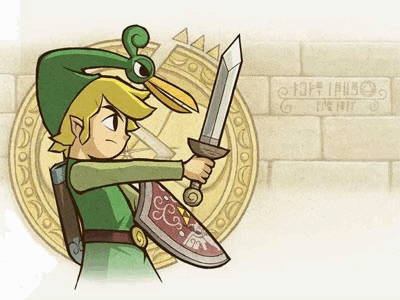
Towards the end of the GameBoy Advances life span, we got one last Zelda game for it. The Legend of Zelda: The Minish Cap. Now this one was also developed by Capcom, but I would definitely call it their best work for the Zelda franchise. It was decently received by critics with an average score of 9/10, which is a really nice score to get. Also, the title itself was filled with an in-depth story-line, that almost makes the game seem it was created by Nintendo themselves. It really showed how that sometimes, when Zelda games are made by other people, they can be just as good as the ones Nintendo could make. Certainly there are three specific exceptions to this, but no one really cares for those three. In terms of holding up over the test of time, I would say it's done rather well, as it features a slightly improved version of Four Swords graphics, and it feels a lot more like a Zelda game than Four Swords did, because Minish Cap had the traditional overworld, multiple dungeons, and of course little "trials" to get to the next dungeon. It was the first Zelda game I ever played, so it does have quite a bit of sentimental value to me, and I would call the music from it some of the best from the franchise, and definitely the best of the GBA, but that's just me being me. Of course some people like Larke12 (Ryan) have yet to play this game, because some person (Chris Weil) hasn't sent him a copy of it yet. The title also saw a re-release on the 3DS e-Shop as an ambassador title, but isn't yet available for purchase on the e-Shop.
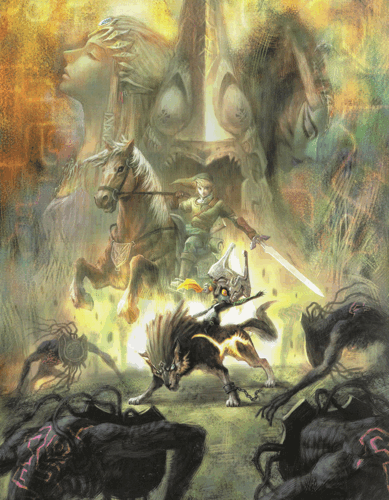
Then, we waited for a little while, and received Twilight Princess. This was the realistic looking Zelda game people had been waiting for, and it was a launch title on the Wii as well as a title on the GameCube. A lot of critics praised it, giving it an average of 9.5/10, but a few critics badgered it. Some called the Wii version a GameCube game with lousy motion controls, others thought the motion controls really added a sense of depth to the game, more so than previous titles. Personally, I've played both the GameCube, and Wii versions of the game, and I feel the Wii version is better, because it feels more smooth, and the motion controls make aiming your bow, clawshot, boomerang, and some other items a lot easier, and it just makes the game a little more fun. Obviously, as the game itself isn't that old at all, only 6 years old, it hasn't faced any real test of time yet, and can still be purchased new as a Nintendo Select title for $20, and then played on either the Wii, or Wii U. Because of this, we won't be seeing a remake, re-release or update for about another 10 years or so, and probably on the handheld console of that time, but instead of waiting that long, just go out and buy the game.
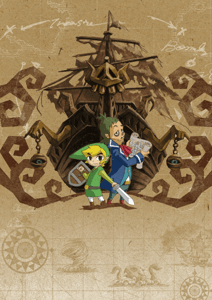
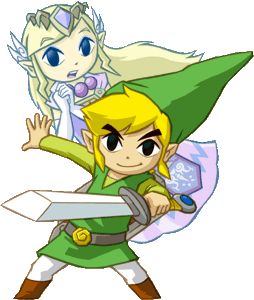
What was supposed to be released alongside, or even before Twilight Princess, was a DS Zelda game - Phantom Hourglass. It was actually delayed a year from 2006 to 2007 for reasons unknown to those outside of the Nintendo company, and some inside the company. I'll actually try to dig as deep as I can and figure this out, and then announce it in a future podcast. Anyhow, critics received the game rather well, but there are some reviews that aren't good. My guess is that they didn't like how you had to use the touchscreen the whole time, and how the game was a little too easy. After Phantom Hourglass, we saw a little technical improvement with transportation in the land of Hyrule, which was a locomotive. Spirit Tracks itself featured an art style practically identical to that of Phantom Hourglass, which was similar to the idea Ocarina of Time and Majora's Mask sharing the same art style. The critics called the game good in terms of puzzles and the story, but a lot of them felt that the game should not have been centered around a train. Some people called it one of the best Zelda games ever, and personally, I feel that it definitely was better than Phantom Hourglass in terms of transportation, story, and even music. Spirit Tracks was also more difficult, but without Phantom Hourglass, there would have been no Spirit Tracks. For the test of time, they've done really well. Personally, I make sure to replay them at least once each per year, which I don't think I've done this year, but there's still plenty of time, and even if I did pay them, I would still do it again, they're just that good.
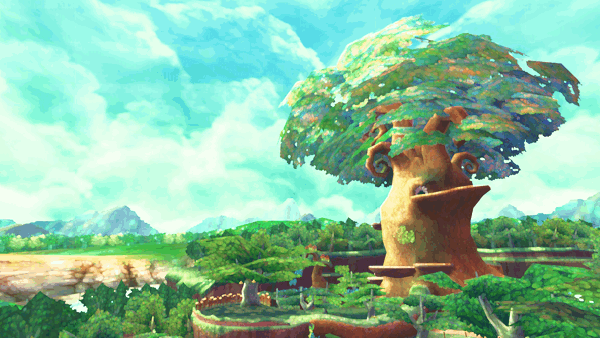
Finally, the latest Zelda game, Skyward Sword released just over a year ago. The game was fully built for the Wii, taking advantage of the motion controls in every way possible. It was the first Zelda game since Wind Waker to get tons of 10/10's across the board, and was compared to Ocarina of Time, with some calling it a better game than Ocarina of Time. A few thought that the whole 1:1 motion control of the Wii remote to the sword was rather silly, as they thought most people would just hack and slash randomly and wildly, but I think Nintendo did a good job keeping it so people couldn't really do that. They created enemies and puzzles that required precise movement of the sword, and therefore, you couldn't just hack and slash your way through. It was of course the first Zelda title to receive a fully orchestrated soundtrack, and I'll have to listen to it again, because I know everyone keeps saying how amazing it is, and how I keep saying it's not as good as previous soundtracks. Anyhow, the game hasn't had any test of time to face, because it's only a year old, and apparently, if you're lucky, you can find the Special Edition with the Golden Wii Remote, like Austin did a couple months ago. The edition with the Symphony CD is not being made still but you should be able to find one on Amazon through 3rd party sellers or chance across one at other retailers.
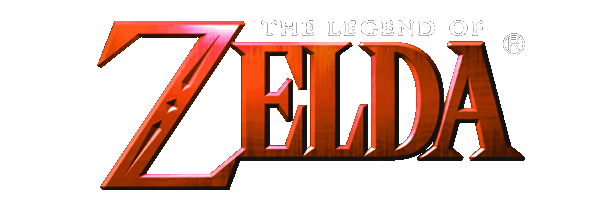
Overall, Zelda games seem almost timeless when you look at it. We've yet to see one that didn't sit well with critics at all, and Nintendo tries to keep outdoing themselves with each release. Who knows where the franchise will be in another 24 years. Will it be celebrating the 50th Anniversary? Odds are, definitely, but no one can predict the future, so we'll just have to wait and see, while playing all of the new Zelda games that come along the way.